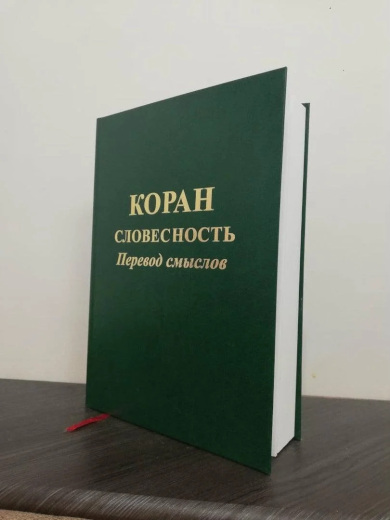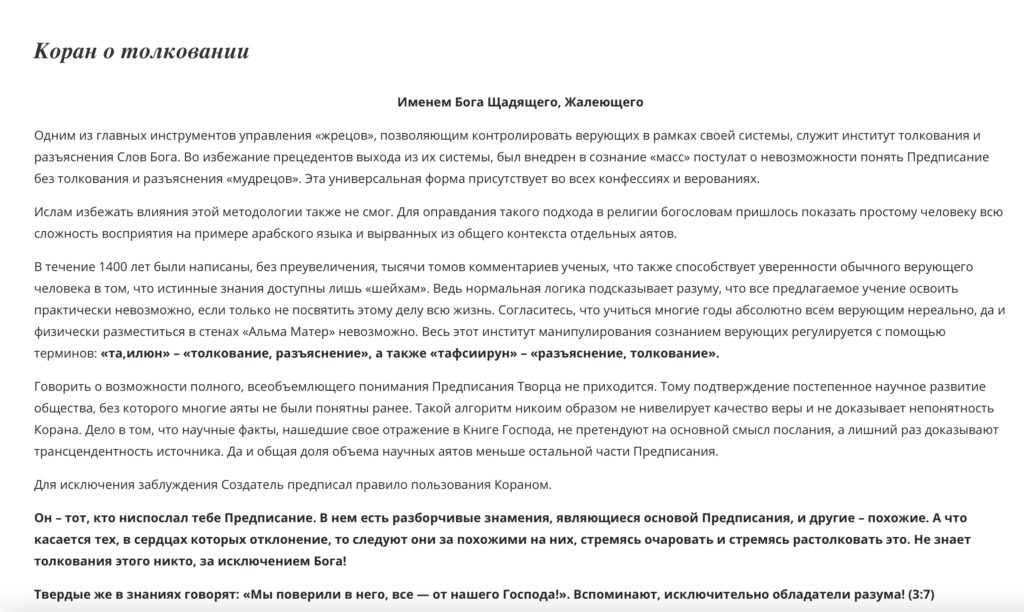Is God’s scripture alone enough to provide sufficient guidance to believers? The general answer across the Abrahamic faiths has been ‘no’, however the tendency to eschew the intermediation of religious scholars and clergy and focus solely on scripture has been represented by various religious movements throughout history. They have emerged at different times and in different religions, as can be seen by the example of groups such as the Karaites in medieval Judaism, or the sola scriptura approach to the Bible in the Christian context. Some comparable movements can be seen in Islamic history as well, however they are few and the theological dogma of their adherents has not left a serious mark on the formation of Islamic theological discourse. Today, however, a movement known as ‘Quranism’ has appeared in various parts of the world which follows the premise that believers should be guided by the Qur’an alone, and our post today is about a recent ‘Quranist’ translation of the Qur’an into Russian, Koran Slovesnost’: Perevod Smyslov, published in Kazakhstan in 2019 by the ethnic Kazakh Serik Ryszhanov.
Ryszhanov reassures his readers that understanding the Qur’an does not require the intervention of a qualified religious authority.
Using his own personal experience as an example, he says that after one and a half years studying Arabic on a self-taught basis, he is able to truly comprehend the meanings of the sacred text. He confidently asserts that theological education is worthless and inevitably ideologically framed by specific dogmas. Ryszhanov claims that specialized expertise and education are not prerequisites for religious understanding, and that interpreting God’s will from scripture is easy for laymen. In order to propose an alternative to religious clerical interpretations, Ryszhanov offers his purportedly non-biased translation into Russian, an approach which can be seen as an attempt on his part to achieve a wider post-Soviet audience for the Qur’an.
While the majority of ethnic Kazakhs are traditionally associated with the Sunni Hanafi tradition, Ryszhanov has a strong intellectual opposition to the ‘historical orthodoxy’ of the region. In fact, his understanding of Islam promotes the idea that believers should focus exclusively on the Qur’an, disregarding the entire corpus of transmitted reports (ḥadīths) about the way the Qur’anic message was understood and practiced by the Prophet Muḥammad himself, as well as his Companions and subsequent generations throughout Muslim history. There is a clear paradox in this approach, which becomes especially prominent in the context of a non-Arabic speaking milieu. Namely, by asserting that the Qur’an is the only authentic and legitimate source of authority, the translator unavoidably takes on the normative role of sole mediator between the source text and his or her reader. Ryszhanov, who criticizes the Muslim clergy and interpretative tradition for inserting themselves between the believer and the holy text, is now the one who interprets for people what their beliefs are and how they should practice their religion, based on his own personal understanding of the Qur’an. The Quranists, by cutting themselves from the intellectual legacy of Islamic civilization, indeed represent a hyperbolic ‘shift to the center’ (Pink, 2019) that presents a radically revisionist view of Islam’s theological, legal and spiritual tradition. Their marginal understanding proposes that there is no need for the legacy of the generations of Muslims, who according to the traditional narrative, collected the Qur’an into the ‘muṣḥaf’, and took care to emulate the way the Prophet himself is said to have practised Islam. By directing the readers to ‘Quran-only’ and in particular to accessing the Qur’an in translation, Ryszhanov formulates a reform project that presents distinctive views on the key topics of Islamic history, dogma and practice.
There are some differences in approach among Quranists, but it is reasonable to see them as a movement with members that share a similar epistemological framework which gives space for interpretation based exclusively in language, reason and science (Bhutta, 2017). Prior to Ryszhanov’s translation, Quranists ideas were popularized by Aslbek Musin (d. 2017), who was a follower of Rashad Khalifa and Edip Yüksel (See qtotw #34: ‘The Qurʾān: A Reformist Translation’ By Edip Yüksel, Layth Saleh Al-Shaiban And Martha Schulte-Nafeh). However, Ryszhanov prefers to distance himself from these figures, and even from the term ‘Quranism’. This can be seen, in particular, in the fact that his teaching does not focus at all on sacred numerology, an approach which has been propagated by Khalifa and Yüksel. Nevertheless, there are many other similarities in their teachings which indicate that Ryszhanov has borrowed at least some of his ideas and interpretations from them. Below we will look more closely at a selection of notable issues in his translation and some related thematical issues on which he has published on his website. (https://narok.com.kz).
To give just one example of a notable translation issue: Quranists, including Ryszhanov, do not follow the commonly accepted understanding of the Qur’anic term ummī, that the Prophet Muḥammad did not know how to read and write, but instead interpret ummī as meaning that he was ‘gentile’, i.e., not familiar with Jewish and Biblical traditions. Ryszhanov adopts the same conceptual understanding as his fellow Quranists and explains ummī on his website by translating it as ‘неискушенный’ (‘not tempted’), thereby implying that the Prophet was not informed about the other Abrahamic scriptures rather than that he was unlettered. (This is especially relevant given that according to Quranist ideology it was the Prophet himself who wrote down the Qur’an.)
Because Quranists do not acknowledge the legacy of the Islamic tradition, Ryszhanov frees himself from the authority of this tradition. As a result, since the Qur’an does not provide a great deal of detailed information about Islamic rituals, Ryszhanov’s teachings can uphold a very distinct understanding of the main Muslim rituals and practices. For example, the pillar of Islam, the five ritual prayers, are reduced to three and can be read in any language. He advocates reduced rules on ritual purification before prayer, and the prescribed period of fasting in Ramadan is reduced to only ten days. The mainstream Muslim soteriological position is also criticized and Ryszhanov promotes a pluralistic view on the issue of salvation. In fact, the Qur’an for Ryszhanov is supra-confessional.
In terms of language choice, the commonly accepted differentiation between the ritual prayer (salāt) and ordinary prayer (duʿāʾ) is transformed in his translation into ‘molitvennaia sviaz’’ (‘prayer connection’/молитвеннaя связь) and zov (‘call’/зов). The Arabic term nafs is translated as ‘lichnost’’ (‘personality’/личность) rather than the standard ‘soul’, and malāʾika (‘angels’) as ‘upravlentsy’ (‘managers’/управленецы). The abandonment of accepted conceptual canons also leads to a very unusual and awkward style of translation and he invents peculiar interpretations for Allah’s ninety-nine names. For instance, al-Raḥmān (‘The Merciful’) is translated as ‘Schadiashchii’ (Sparing/Щадящий), while the Qur’an itself becomes ‘slovesnost’’ (‘literature’/словесность), which somehow reinforces Ryszhanov’s ideas about written as well as oral nature of the text.
However, despite being critical of conventional approaches to the interpretation and translation of the Qur’an, Ryszhanov still calls his rendition a ‘translation of meanings,’ quite possibly being influenced in this by the standard practice of Muslim publishers.
The role of the state is particularly prominent in Ryszhanov’s discourse. In this way, he differs significantly from Yüksel, who openly criticizes authoritarianism in countries with predominantly Muslim populations. Ryszhanov fully supports the idea of state authority and through this support seeks his own recognition. He presents his translation as an alternative to ‘obscurantism and extremism’, and fully supports the government in its policy of securitization towards various Islamic groups. Ryszhanov also uses an interesting strategy to negotiate the complexities of his own religious authority. According to the state constitution, Kazakhstan is a secular country, but Islam is also an important part of society as it is the religion of the majority. Kazakhstan thus has a state-supported religious Islamic institution, the DUMKZ (Muslim Spiritual Administration of Kazakhstan/Muftiyat), which adheres to a Ḥanafī-Sunni understanding of Islam. However, presumably because of irreconcilable incompatibilities in theological outlook, Ryszhanov did not seek DUMKZ approval for his Qur’an translation. Instead, his translation carries a governmental stamp from the Ministry of Public Development on the first page, thereby demonstrating official approval of his translation, albeit from a more unexpected source.
In many post-Soviet countries, there is an attitude of caution towards the incursion of ‘foreign influences’ on local Muslim practices, which has led to a dichotomy according to which things that are believed to be ‘local’ are seen as peaceful, while anything ‘foreign’ is dangerous and threatening. The phenomenon of Quranism, which is essentially ‘foreign,’ is a curious example that flies in the face of this state narrative, and the rise of Qur’anism in such countries as Kazakhstan and Russia (in, for example, the writings of Rustam Batrov and Taufik Ibragim) seems to be deemed acceptable from the governmental perspective so far. However, the reception of Ryszhanov’s Russian Qur’an translation since its publication in 2019 has been underwhelming: it has not won itself a large readership or many advocates, nor has it yet been met with any serious critique on the part of Muslim preachers, both of which factors demonstrate the marginality of such an approach to the Qur’an in the Kazakh milieu.
Elvira Kulieva



